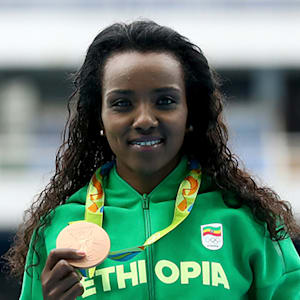Tirunesh DIBABA
Biografia
Ethiopia’s Tirunesh Dibada is the youngest female world champion in the history of athletics, the first woman to achieve the Olympic 5,000m/10,000m double, and the first to successfully defend a long-distance title at the Games.
Born to run
Tirunesh Dibaba was born the city of Bekoji, nestled in the high plains of Ethiopia at an altitude of 2,800m, and home to a number of long-distance champions, including Derartu Tulu and Kenenisa Bekele, who between them won five Olympic titles. She attributes her skill as a runner and her stamina to necessity: “I grew up running with pails of water that I went to fetch from the river after school every day, to help my mother,” she once explained.
She is one of three siblings who have enjoyed success on the track. Her older sister Ejegayehu was a 10,000m Olympic silver medalist in Athens in 2004, while younger sister Genzebe is the 2015 world champion and current world record holder over 1,500m.
Teenage track tyro
Dibaba was just 18 when she took part in her first major international competition, the 2003 World Athletics Championships in Paris. Going into the last straight in the 5,000m final, she shrugged off her opponents to cross the line in 14.51.72 and become the youngest female athletics world champion in history, and the latest in a long line of Ethiopian long-distance greats. “When you compete for Ethiopia you must bring back gold,” she later explained. “People in our country don’t accept anything less. Winning silver or bronze is the same as coming fifth or sixth.”
Looking back on that maiden victory, she said: “I was only 18 and I remember how desperately I wanted to be a champion. Winning was so amazing! I’ll always remember it.”
Olympic debut
Dibaba’s early success while still in her teens earned her the nickname ‘Baby-Faced Destroyer’. Despite having her preparations for Athens 2004 disrupted by a knee injury, she still managed to win bronze in the 5,000m, finishing behind her compatriot Mereset Defar and Kenya’s Isabella Ochichi. The following year, at the Worlds in Helsinki, she completed a 5,000m/10,000m double, and then in 2007, in Osaka (JPN) claimed her fourth world title, with a now trademark acceleration into the finish of the 10,000m final. To go with these successes on the track, Dibaba was also crowned world cross-country champion five times between 2003 and 2008.
A historic double in Beijing
On 6 June 2008 in Oslo, Dibaba set a new 5,000m world record of 14.11:15, which has yet to be bettered. Later that year, at the Olympic Games in Beijing, she achieved another historic first for women’s athletics, winning both the 10,000m (in a new Olympic record time of 29.54:66) and then the 5,000m, seeing off the challenge of Turkey’s Ethiopian-born runner Elvan Abeylegesse on both occasions. In each race her modus operandi was the same: accelerating into an unstoppable breakaway in the final lap to leave her rivals eating dust.
Looking to the future
Despite four years battling with injury, Dibaba was back in the fray for the 10,000m final at London 2012, and remarkably managed to retain her title (yet another first). Going into the final 800m she showed that she had lost none of her ability to change gear, surging into an unbeatable lead over the last two laps. She followed up by winning bronze in the 5,000m, where she was beaten by her compatriot and longstanding rival Meseret Defar.
Fifth world title and maternity leave
At the 2013 World Championships in Moscow (RUS) Dibaba won her third 10,000m world title, taking her total number of world championship crowns to five ten years. A year later she made her marathon debut at the London Marathon in 2014, where she placed third with a time of 2:20:34.
Married to double Olympic 10,000m silver medalist Sileshi Sihine, Dibaba then took a break from competition to start a family and in March 2015 gave birth to her son Nathan. However, motherhood didn’t slow her down for long, and in May 2016, little more than a year after giving birth, she returned to the track. Shortly after she suffered her first ever defeat over 10,000m, finishing third in the Ethiopian Olympic selection trials in Hengelo (NED), losing out to the upcoming youngster Almaz Ayana.
A third Olympic 10,000m medal in Rio
Looking ahead to Rio 2016, where she was aiming for an unprecedented third title in the 10,000m, she mused: “I run to make people happy,” she explained. “I’ve done everything expected of me as an athlete. I’ve won many competitions, but I’ve yet to run the marathon. The Olympic marathon is what I have left to achieve. I’ll compete in it soon. I want to achieve something that is historic and unforgettable.”
It wasn’t Dibaba but Ayana who stole the spotlight on the first day of track and field competition in Rio on 12 August. The youngster stormed to an incredible victory over 10,000m, smashing Wang Junxia’s 1993 world record by 14 seconds with a time of 29:17.45.
Dibaba finished in third behind Kenyan Viviane Cheruyot, despite running her fastest ever time over the distance (23:32.52) and finishing under the previous world record. Despite failing to defend her Olympic title she nevertheless achieved an unrivalled feat, winning a third successive Olympic medal in the distance and a sixth Olympic medal in total (three gold and three bronze).
“I’ve done something that no one else has done before me and I’m very proud,” she said of her achievement.
In primo piano
Tirunesh DIBABA
Replay
Risultati Olimpici
Athlete Olympic Results Content
You may like

